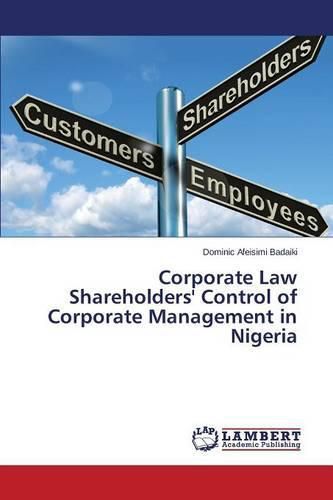Readings Newsletter
Become a Readings Member to make your shopping experience even easier.
Sign in or sign up for free!
You’re not far away from qualifying for FREE standard shipping within Australia
You’ve qualified for FREE standard shipping within Australia
The cart is loading…






This title is printed to order. This book may have been self-published. If so, we cannot guarantee the quality of the content. In the main most books will have gone through the editing process however some may not. We therefore suggest that you be aware of this before ordering this book. If in doubt check either the author or publisher’s details as we are unable to accept any returns unless they are faulty. Please contact us if you have any questions.
This research work appraises shareholders’ control of corporate management in Nigeria.The justification for it lies in the need for shareholders to have authority to take decisions that affect their property and check management inadequacies.Traditional company law principles seek to prevent fraud against the shareholders and are pervaded by the philosophy of disclosure and publicity.Like most of the doctrines that emerged from the history of English company law, it was pre-occupied by shareholders’ protection rather than shareholders’ control.The device of the corporation marks a distinction between the shareholders and the company and provides a basis for the allocation of powers to the shareholders and Board of Directors, the two organs of management.In this connection, shareholders’ control is determined by the relation between the two organs of management. Despite the enormous powers that are vested in the Shareholders in General Meeting, shareholders exercise weak control.It is recommended a change in the structure of management by creating a two-tier representative board system, under which there should be a non-executive supervisory board to be appointed by the shareholders
$9.00 standard shipping within Australia
FREE standard shipping within Australia for orders over $100.00
Express & International shipping calculated at checkout
This title is printed to order. This book may have been self-published. If so, we cannot guarantee the quality of the content. In the main most books will have gone through the editing process however some may not. We therefore suggest that you be aware of this before ordering this book. If in doubt check either the author or publisher’s details as we are unable to accept any returns unless they are faulty. Please contact us if you have any questions.
This research work appraises shareholders’ control of corporate management in Nigeria.The justification for it lies in the need for shareholders to have authority to take decisions that affect their property and check management inadequacies.Traditional company law principles seek to prevent fraud against the shareholders and are pervaded by the philosophy of disclosure and publicity.Like most of the doctrines that emerged from the history of English company law, it was pre-occupied by shareholders’ protection rather than shareholders’ control.The device of the corporation marks a distinction between the shareholders and the company and provides a basis for the allocation of powers to the shareholders and Board of Directors, the two organs of management.In this connection, shareholders’ control is determined by the relation between the two organs of management. Despite the enormous powers that are vested in the Shareholders in General Meeting, shareholders exercise weak control.It is recommended a change in the structure of management by creating a two-tier representative board system, under which there should be a non-executive supervisory board to be appointed by the shareholders